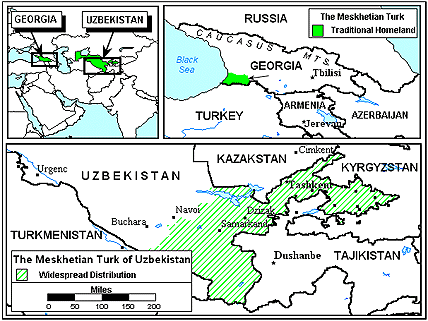Shall I Stay or Go?
Approximately 9,000 Meskhetians have been registered to receive repatriate status in their ancestral land, Georgia. Beyond several external obstacles (e.g. governmental, financial and security issues) hindering their resettlement, some evidence suggests that human factors such as age also have an impact on the decision of resettling in Georgia.
The repatriation of Meskhetian communities to Georgia has received international attention in the past two decades. However, the actual repatriation process taking place on the local level is still slow and lacks essential resources and impact despite the fact that the Law on Repatriation was adopted in 2007. A project called Facilitating Civil Integration and Promoting the Rights of the Repatriated Meskhetian Community in Georgia conducted between 2012 and 2014 cannot be considered a real success either as Konstantine Peradze who works at the Open Society Foundation Georgia and is coordinating the project Advancing National Integration explains himself:
We didn’t manage to achieve major goals, which was to support the government in repatriation; the actual repatriation was delayed and I’d say it still hasn’t occurred. There were minor achievements, like supporting the government to draft and initiate by laws to ease the repatriation process itself but other than that we didn’t get initial results.
Additionally, the project isn’t going to be continued because donors don’t show further interest in supporting the repatriation.
Human factors have to be taken into consideration besides the so-called external ones when it comes to exploring the decision on resettling in Georgia. Tom Trier, George Tarkhan-Mouravi and Forrest Kilimnik in their book Meskhetians: Homeward Bound… elaborate on the Meskhetians’ collective identity and their feelings for and their connection to their ancestral homeland as well as differentiate between home and homeland comparing the younger and the older generations of Meskhetians. While the former group consider Central Asia, the latter one Georgia as their home, more specifically the region of Samtskhe-Javakheti.
There are no official statistics on ‘gender/age composition of the applicants, as that involves personal data that is protected by law (similar to refugee personal information — which has a higher degree of protection)’, says Peradze. ‘But, from my experience, it’s entire families that have applied to repatriate, so we have a usual mix of age/gender. While the older generation is more eager to repatriate as they have been carrying this idea for all their lives, younger ones seem to be well integrated into places of their residence.’ Some stories of Meskhetian individuals can be read on Repatriation.ge[1] as well.
The Meskhetians are originally from the Samtskhe-Javakheti region, but Stalin ordered their deportation from Georgia to Central Asian countries such as Azerbaijan, Kazakhstan, Kyrgyzstan and Uzbekistan in 1944. Meskhetians are mentioned among those peoples whose rehabilitation still hasn’t been fulfilled yet. Nevertheless, not just the Meskhetians’ history, but also the circumstances of their rehabilitation is a complex issue that is needed to be discussed and reflected upon in more detail and from different angles in the future.
Photos: ataccdayton.org; www.prayway.com
[1]http://repatriation.ge/index.php?m=14
The article was originally written as an assignment for the course Minority Realities in the News organized by Minority Rights Group International.
Originally published at www.humanamagazin.eu.


